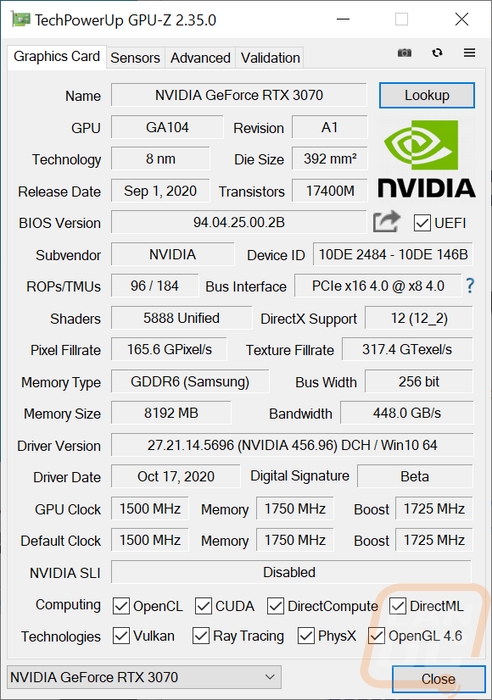2020 has been a crazy year for almost everyone and the list of reasons for it are really long, especially with the ongoing pandemic. But on the hardware front, Nvidia’s announcement about their 3000 series of cards surprised a lot of people. The RTX 3080 and the RTX 3090 were a big part of that, but the RTX 3070 also created a lot of excitement. Nvidia showed its performance to be right with last generations' flagship, the RTX 2080 Ti, and with a price of $499 it immediately changed the used market and gave gamers who don’t have a bottomless wallet hope. Well the RTX 3070 will be available on October 29th at 9 am EST and before that mad dash, I’m going to put the RTX 3070 Founders Edition through our test suite to see if the RTX 2080 Ti claims are true and to find out if it is as good of a deal as it sounds.
Product Name: Nvidia RTX 3070 Founders Edition
Review Sample Provided by: Nvidia
Written by: Wes Compton
Amazon Affiliate Link: HERE
What’s the RTX 3070 all about
Nvidia’s announcement of their 3000 series of cards came alongside information on Ampere which is what they are based on. I spoke about ampere in our RTX 3080 review but to keep things short it is the successor to Turing which was used in the 2000 series of cards. They took advantage of the 8nm process from Samsung to cut down die size and power usage from Turing’s 12 nm process. But most of the improvements come from improvements in the Tensor and RT cores as well as a change that allows FP32 to run on the normal FP32 core as well as the Integer 32 core now which doubles the possible performance in floating-point when integer calculations aren’t needed. Turing had each split into their own dedicated cores.
When we dive into the specifications for the RTX 3070 you can see that Nvidia is using the GA104-300 GPU which is a cut down version of the GA102 from the RTX 3080. It has 46 SMs vs the 68 of the 2080. This put the CUDA core count at 5888 which is a crazy number even still once you compare it with the RTX 2080 TI which had 4352 and the RTX 2070 which had 2304. The tensor core count is much lower than the 2000 series cards, even the 2070 but this is the new 3rd generation tensor core design and the same goes for the ray tracing cores which you get 46, one per SM which is more than the 2070 had, not to mention these are the new 2nd gen design. The 3070’s boost clock ends up higher than the RTX 3080 but it does use the older memory that was used with the 2000 series of cards which comes in at 14 Gbps, not the new GDDR6X which runs at 19 Gbps. It also goes back down to the 256-bit memory controller, the same size as the older RTX 2070. The 220 watt TGP is higher than the RTX 2070 but is in line with the RTX 3080 which was higher than the RTX 2080 Ti. The 17.4 billion transistors is crazy to see when you compare it to the 2080 Ti which has 18.6 billion especially when the die size is so much smaller, smaller than the 2070 even. The pricing of the RTX 3070 Founders Edition isn’t set up higher than the rest of the lineup like how Nvidia did the 2000 Series as well, the flat MSRP is $499 though we know that aftermarket cards will go up from there.
|
Specifications |
RTX 2070 FE |
RTX 2080 Ti FE |
RTX 3070 FE |
RTX 3080 FE |
|
SMs |
36 |
68 |
46 |
68 |
|
CUDA Cores |
2304 |
4352 |
5888 |
8704 |
|
Tensor Cores |
288 (2nd Gen) |
544 (2nd Gen) |
184 (3rd Gen) |
272 (3rd Gen) |
|
RT Cores |
36 (1st Gen) |
68 (1st Gen) |
46 (2nd Gen) |
68 (2nd Gen) |
|
Texture Units |
144 |
272 |
184 |
272 |
|
ROPs |
64 |
88 |
96 |
96 |
|
GPU Boost Clock |
1710 MHz |
1545 MHz |
1725 MHz |
1710 MHz |
|
Memory Clock |
14 Gbps |
14 Gbps |
14 Gbps |
19 Gbps |
|
Total Video Memory |
8192 MB GDDR6 |
11264 MB GDDR6 |
8192 MB GDDR6 |
10240 MB GDDR6X |
|
Memory Interface |
256-bit |
352-bit |
256-bit |
320-bit |
|
Memory Bandwidth |
448 GB/s |
616 GB/s |
448 GB/s |
760 GB/s |
|
TGP |
185 Watts |
260 Watts |
220 Watts |
320 Watts |
|
Transistor Count |
10.8 Billion |
18.6 Billion |
17.4 Billion |
28.3 Billion |
|
Die Size |
445 mm² |
754 mm² |
392 mm² |
628.4 mm² |
|
GPU Codename |
TU106 |
TU102 |
GA104-300 |
GA102 |
|
Launch MSRP |
$599 (FE) |
$1,199 (FE) |
$499 |
$699 |
As always I also ran GPUz before getting into testing. I wanted to see if the clock speeds matched up with the specifications and I also like to document the BIOS version and driver that I did my testing on. In this case, my driver was the pre-launch driver 456.96. The boost clock lines up as does the memory clock speed.



